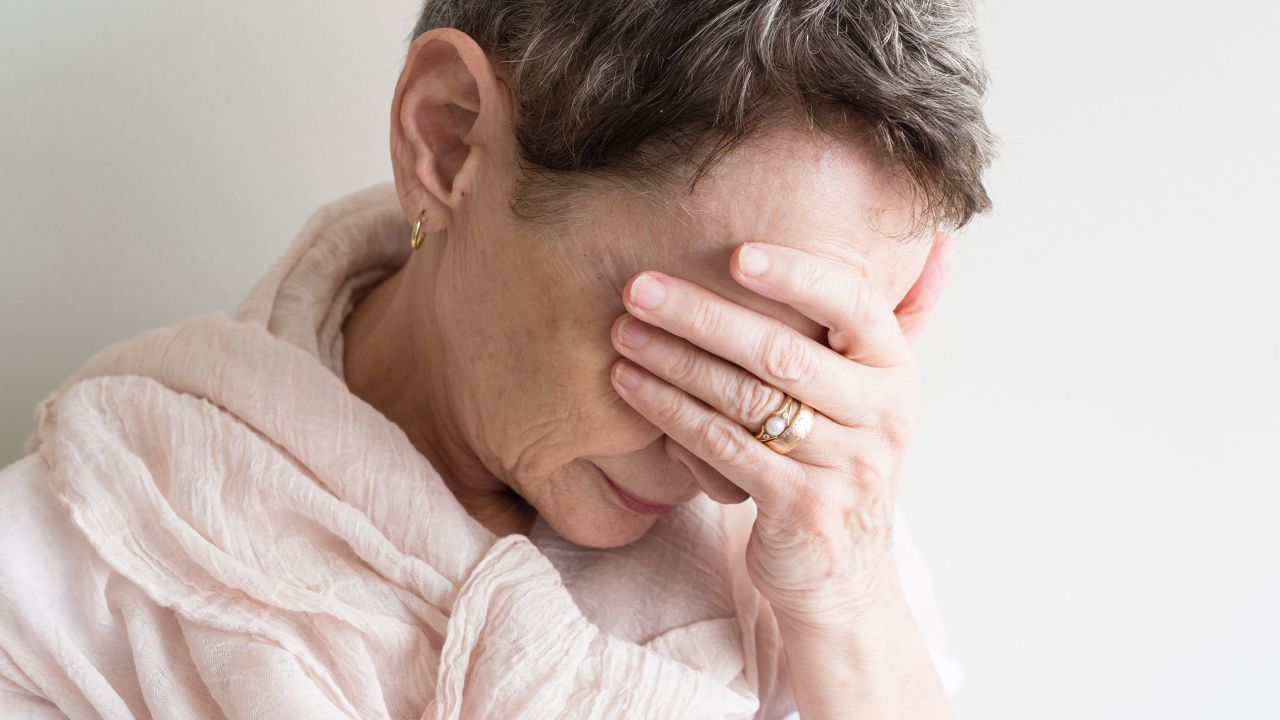Under 65?
US recommends anxiety test 0:45
(CNN) --
Anxiety is the most common psychological disorder affecting adults in the United States.
In older people, it is associated with considerable distress, as well as health problems, decreased quality of life, and increased rates of disability.
However, when the US Preventive Services Task Force, an influential group of independent experts, suggested last year that adults be tested for anxiety, it left out one group: those 65 and older.
The main reason the task force cited in the draft recommendations published in September was that "current evidence is insufficient to assess the balance between benefits and harms of anxiety screening" in all older adults.
(Final recommendations are expected later this year.)
Most older adults with anxiety have battled this condition since they were younger.
Credit: Natalie Board/AdobeStock
The task force noted that questionnaires used to screen for anxiety may not be reliable for older adults.
The analysis consists of evaluating people who do not have obvious symptoms of worrisome medical or psychological disorders.
"We recognize that many older adults suffer from mental disorders such as anxiety," and "urgently call for more research," said Lori Pbert, associate chief of the division of Preventive and Behavioral Medicine at the University of Massachusetts Chan School of Medicine and a long-time member of the working group that collaborated on the recommendations on anxiety.
This "we don't know enough yet" stance is disliked by some experts who study and treat older people with anxiety.
Dr. Carmen Andreescu, an associate professor of psychiatry at the University of Pittsburgh, called the task force's position puzzling because "it is well established that anxiety is not uncommon in older adults and that effective treatments exist."
advertising
"I can't think of any danger in identifying anxiety in older adults, especially since there is no harm in doing so and we can do things to reduce it," said Dr. Helen Lavretsky, a professor of psychology at UCLA.
Doctors often recommend medication to relieve anxiety when mental health care may be hard to find.
Credit: Willie B. Thomas/Digital Vision/Getty Images
In a recent editorial in the academic journal JAMA Psychiatry, Andreescu and Lavretsky noted that only one-third of older adults with generalized anxiety disorder (persistent intense worry about everyday matters) receive treatment.
This is worrisome, they noted, considering the relationship between anxiety and stroke, heart failure, coronary heart disease, autoimmune diseases and neurodegenerative disorders such as dementia.
Other forms of anxiety that often go undetected and untreated in older adults include phobias (such as fear of dogs), obsessive-compulsive disorder, panic disorder, social anxiety disorder (fear of being evaluated and judged by others) and post-traumatic stress disorder.
The latent disagreement over the evaluation of anxiety in older adults draws attention to the importance of anxiety in old age, a concern that was heightened during the covid-19 pandemic, which magnified stress and worry among older people.
This is what you should know.
What is anxiety, what are the symptoms and how to seek help?
anxiety is common
According to a book chapter published in 2020, authored by Andreescu and a colleague, up to 15% of people over the age of 65 who live outside nursing homes or other facilities have a diagnosable anxiety disorder.
Up to half have anxiety symptoms such as irritability, worry, restlessness, decreased concentration, sleep changes, fatigue, avoidance behaviors, which can be distressing but do not justify a diagnosis, the study says.
Most seniors with anxiety have struggled with the disorder from an early age, but the way it manifests itself can change over time.
In particular, older adults tend to be more anxious about issues such as illness, loss of family and friends, retirement and cognitive decline, the experts said.
Only a small part develop anxiety after reaching the age of 65.
Anxiety can be hard to identify in older adults
Older adults often downplay anxiety symptoms, thinking "this is what it's like to get old" instead of "this is a problem I should do something about," Andreescu said.
In addition, they are more likely than young adults to report "somatic" complaints, physical symptoms such as dizziness, fatigue, headaches, chest pain, shortness of breath and gastrointestinal problems, which can be difficult to distinguish from underlying medical conditions, according to Gretchen. Brenes, a professor of Gerontology and Geriatric Medicine at Wake Forest University School of Medicine.
According to Dr. Jordan Karp, professor of psychiatry at the University of Arizona School of Medicine in Tucson, some types of anxiety or anxious behaviors, particularly hoarding and fear of falling, are much more common in older adults. older adults, but the questionnaires designed to identify anxiety do not usually ask about these issues.
When older people do express their concerns, medical professionals often dismiss them as normal given the challenges of aging, says Dr. Eric Lenze, chief of psychiatry at Washington University School of Medicine in Saint Louis and third author of the paper. recent editorial in JAMA Psychiatry.
He and other experts suggested that a few simple questions can help determine if an older adult needs to be evaluated for anxiety: Do they have recurring worries that are difficult to control?
Do you have trouble sleeping?
Does he feel more irritable, stressed or nervous?
Do you have trouble concentrating or thinking?
Do you avoid doing things that he normally likes to do because he is caught up in his worries?
Stephen Snyder, 67, who lives in Zelienople, Pennsylvania, and was diagnosed with generalized anxiety disorder in March 2019, would answer "yes" to many of these questions.
"I have a type A personality and I worry a lot about a lot of things: my family, my finances, the future," he told me.
"Also, I've tended to dwell on things that happened in the past and get overwhelmed."
Treatments are effective
Psychotherapy, particularly cognitive behavioral therapy, which helps people address persistent negative thoughts, is often considered the first line of treatment for anxiety in older adults.
In a review of the evidence for the task force, the researchers noted that this type of therapy helps reduce anxiety in older people who attend primary care settings.
Lenze noted that relaxation therapy, which may include deep breathing exercises, massage or music therapy, yoga and progressive muscle relaxation, is also recommended.
Because mental health professionals, particularly those specializing in geriatric mental health, are very hard to find, primary care physicians often recommend medication to relieve anxiety.
How psilocybin, the psychedelic from mushrooms, can rewire the brain to ease depression, anxiety and more
Two categories of drugs are commonly prescribed: antidepressants known as SSRIs (selective serotonin reuptake inhibitors) and SNRIs (serotonin-norepinephrine reuptake inhibitors), both appear to help older adults, experts say.
Benzodiazepines, a class of sedative medications such as Valium, Ativan, Xanax, and Klonopin, are commonly prescribed for older people but should be avoided.
The American Geriatrics Society has warned health care providers not to use them in older adults, except when other therapies have failed, because they are addictive and significantly increase the risk of hip fractures, falls and other accidents, and cognitive impairment. short term.
-- KHN (Kaiser Health News) is a national newsroom that produces in-depth journalism on health issues. Along with Policy Analysis and Polling, KHN is one of the three main operating programs of the KFF (Kaiser Family Foundation). KFF is a nonprofit organization that provides information on health issues to the entire nation.
older adults anxiety






